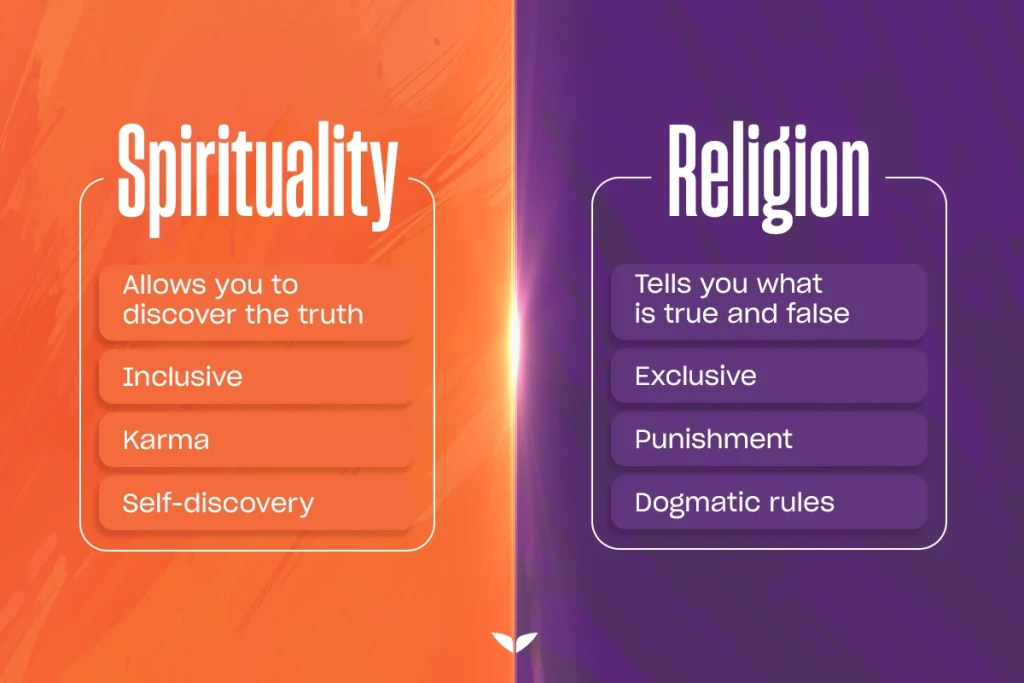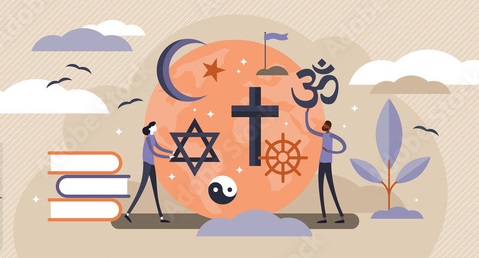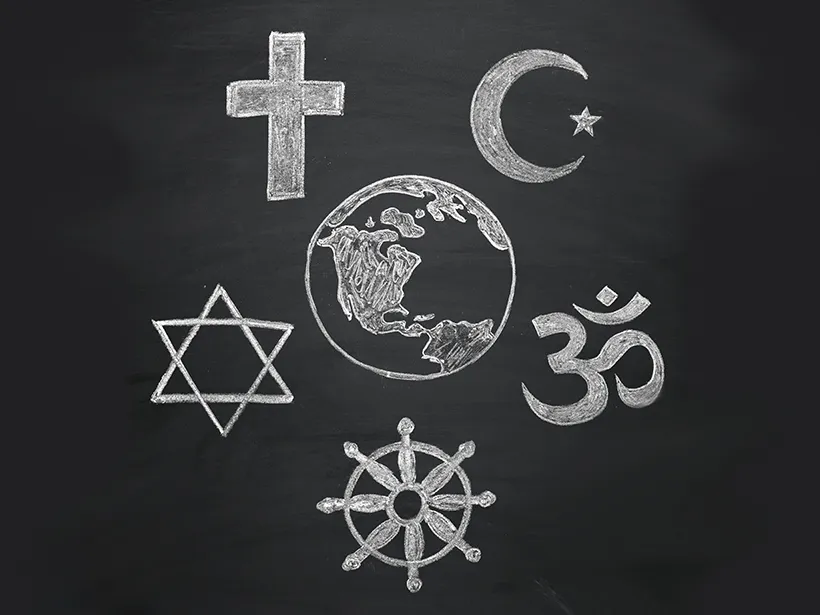The dichotomy between religion and spirituality has sparked intellectual and philosophical discussions for centuries. While some use the terms interchangeably, they possess distinct connotations and implications. This essay aims to explore the nuanced differences between religion and spirituality, delving into their origins, practices, and the complex relationship they share.

Religion: The Institutional Framework of Belief
Religion typically refers to organized systems of faith and worship, encompassing structured institutions, rituals, doctrines, and moral codes. It provides a framework for believers to adhere to shared beliefs, engage in communal worship, and follow prescribed practices. Religions often have established hierarchies, leaders, and sacred texts that guide their followers’ lives. Examples of organized religions include Christianity, Islam, Judaism, Buddhism, and Hinduism.
Spirituality: The Personal Quest for Meaning
Spirituality, on the other hand, pertains to an individual’s personal and subjective quest for a deeper connection with the transcendent or divine. It goes beyond the confines of religious institutions and embraces a more fluid and open-ended approach to exploring one’s relationship with the universe. Spirituality involves seeking inner peace, personal growth, and a sense of purpose that transcends the material world. This quest can manifest through meditation, introspection, nature appreciation, and other practices that promote self-awareness and transcendence.
The Overlapping Landscape: Religion and Spirituality
While religion and spirituality exhibit distinct characteristics, they often intersect. Many religious individuals find spiritual solace within the confines of their faith, utilizing the prescribed practices and rituals to nurture their spiritual connection. Conversely, some who identify as spiritual might draw inspiration from multiple belief systems without subscribing to a particular religion. This overlapping landscape highlights the complexity of the relationship between the two concepts.
Choosing a Path: Comparative Analysis
The choice between a religious framework and a spiritual journey is deeply personal and varies from individual to individual. Religions offer a structured path, providing a sense of community, moral guidelines, and a comprehensive worldview. Spirituality, on the other hand, empowers individuals to explore their unique beliefs, adapting practices that resonate with their inner experiences.
Harmony and Tension: Finding Common Ground
Harmony and tension can coexist between religion and spirituality. On one hand, spiritual practices can enrich religious experiences, deepening the connection between the individual and the divine. On the other hand, tensions arise when institutional dogma clashes with individual spiritual insights. Finding common ground requires open dialogue, acceptance of diverse viewpoints, and an appreciation for the multifaceted nature of belief.
While religion and spirituality are distinct, they share an intricate relationship within the realm of belief. Religion provides a structured framework for worship and community, while spirituality offers a personal journey of inner exploration and connection with the transcendent. The choice between the two is a matter of personal inclination and the quest for meaning. Ultimately, understanding the differences and connections between religion and spirituality enriches our appreciation for the diverse ways humans seek understanding and purpose in the universe.

Unveiling the Distinctive Threads: Religion and Spirituality
The interplay between religion and spirituality has ignited debates, discussions, and introspection on the nature of belief. While they share similarities, each concept possesses distinct characteristics that shape the way individuals perceive and engage with their worldview. This essay seeks to unravel the distinctive threads that set religion and spirituality apart while acknowledging their interconnectedness.
Religion: Anchoring Belief in Tradition
Religion, rooted in tradition and doctrine, offers a comprehensive framework for understanding the cosmos and human existence. It typically involves an organized community united by shared beliefs, rituals, moral principles, and texts. Religion often provides a moral compass, offering guidelines for ethical behavior and social interactions. Followers of a religion find solace in its structured practices, communal support, and the authoritative guidance of religious leaders.
Spirituality: Embracing the Personal Quest
Spirituality, in contrast, embraces a more individualistic and fluid approach to belief. It centers on the direct personal experience of the divine or transcendent, unbound by the confines of religious institutions. Spiritual seekers prioritize introspection, mindfulness, and meditation to connect with the inner self and explore the mysteries of existence. Spirituality transcends religious boundaries and encourages the pursuit of inner growth, authenticity, and harmony with the universe.
The Intersection: Religion and Spirituality
The boundary between religion and spirituality is not rigid; it’s a permeable membrane where the two concepts intersect. Many religious individuals infuse their faith with personal spiritual practices, enriching their connection with the divine. Concurrently, spiritual seekers might draw inspiration from various religious traditions, adapting practices that resonate with their unique experiences.
The Fundamental Contrast: Dogma vs. Freedom
A fundamental contrast between religion and spirituality lies in the nature of belief. Religion often adheres to established dogma and authoritative texts, fostering a sense of stability and guidance. Conversely, spirituality celebrates the freedom to explore beliefs and practices outside the confines of dogma. This contrast can lead to tensions, as adherents of organized religions may view spirituality as a departure from traditional teachings.
Seeking Common Ground: Nurturing Understanding
Seeking common ground between religion and spirituality requires mutual respect and understanding. Acknowledging the shared pursuit of meaning, connection, and purpose can bridge the gap between adherents of different belief systems. Open dialogue and interfaith interactions can foster a sense of unity while honoring the individual paths that people choose.
The distinction between religion and spirituality is nuanced yet significant. Religion offers structure, community, and tradition, while spirituality emphasizes personal experience, authenticity, and inner exploration. The interplay between these concepts enriches our understanding of human belief and the myriad ways individuals navigate the search for transcendence and meaning. Embracing these diverse perspectives allows us to appreciate the intricate tapestry of human spirituality.

Exploring the Realm of Belief: Navigating Religion and Spirituality
The journey into the realm of belief takes us on a captivating odyssey through the intertwining paths of religion and spirituality. These paths, while distinct, possess a profound influence on human understanding, ethics, and the quest for meaning. This essay continues to unravel the intricate nuances of religion and spirituality, dissecting their impact on society, psychology, and the ongoing discourse surrounding their significance.
Religion’s Societal Role: The Anchor of Identity and Morality
Religion often serves as a cornerstone of societal identity, shaping cultural norms, values, and ethical frameworks. Its structured rituals and communal gatherings foster a sense of belonging, providing individuals with a sense of purpose beyond their individual existence. The religious narrative not only addresses questions of origin and destiny but also instills moral principles that guide human behavior. For instance, the Ten Commandments in Judaism and Christianity and the Five Pillars of Islam are emblematic of how religious teachings underpin moral integrity.
Spirituality’s Psychological Impact: Nurturing Inner Fulfillment
The realm of spirituality delves into the human psyche, offering a unique approach to fostering inner fulfillment. As individuals engage in introspective practices such as meditation, mindfulness, and contemplation, they tap into a wellspring of self-awareness and emotional well-being. This connection with the inner self cultivates resilience, reducing stress and enhancing mental health. Spirituality encourages individuals to explore the depths of their consciousness, seeking a sense of harmony with both themselves and the cosmos.
Navigating the Moral Landscape: Dogma vs. Personal Ethics
One of the central distinctions between religion and spirituality lies in their approach to morality. Religion often prescribes a set of moral guidelines within the framework of sacred texts and teachings. Adherents find ethical guidance in these doctrines, fostering a cohesive moral community. In contrast, spirituality encourages a more personal exploration of ethical values, allowing individuals to align their behavior with their inner convictions and experiences. This distinction opens discussions about the source and nature of morality, sparking debates that explore the dynamic between divine decree and individual conscience.
Beyond the Surface: The Search for Transcendence
Both religion and spirituality share the fundamental pursuit of transcendence—a yearning to connect with a realm beyond the material world. Religion achieves this through established rituals and practices, offering a tangible avenue for believers to access the divine. In contrast, spirituality often seeks transcendence through direct personal experiences, unmediated by religious intermediaries. This quest for the ineffable underscores humanity’s innate curiosity about the mysteries that lie beyond the visible realm.
Symbiosis and Discord: The Religious-Spiritual Continuum
The dynamic relationship between religion and spirituality can be likened to a continuum rather than a dichotomy. Religious institutions often provide a platform for spiritual experiences, grounding them in tradition and community. Conversely, spiritual experiences can infuse new vitality into religious practices, infusing them with personal depth and meaning. Nevertheless, tensions arise when dogmatic rigidity clashes with the fluidity of spiritual exploration, underscoring the complexity of this relationship.
The Quest for Harmony: Embracing Pluralism
The discourse surrounding religion and spirituality extends beyond philosophical musings, touching on contemporary challenges in diverse societies. Pluralistic societies host a tapestry of beliefs, prompting conversations about mutual respect and understanding. Recognizing that the human journey into belief is as varied as the stars in the sky, proponents of both religion and spirituality seek common ground, fostering interfaith dialogues that celebrate diversity while nurturing harmony.
In summation, the exploration of religion and spirituality unfolds as an intricate tapestry woven from the threads of belief, identity, morality, and transcendence. These concepts, while distinct, intersect and enrich the human experience in profound ways. Religion offers stability, community, and a moral compass, while spirituality provides personal growth, self-awareness, and an avenue for direct connection with the divine. The interplay between these two paths defines the spectrum of human belief, inviting us to embrace the mosaic of perspectives that collectively contribute to our shared understanding of existence.
























































































































































